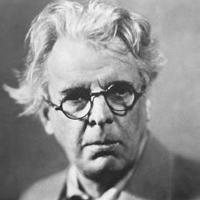Easter 1916 by William Butler Yeats: Introduction
Easter 1916 is a poem that refers to the Irish revolutionary upsurge of Easter 1916, when the revolutionary planned unsuccessfully to overthrow the British reign in Ireland; the immature plan had turned out a big failure.

William B. Yeats (1865-1939)
Fifteen hundred people attempted the 'seize’ of the government office buildings of Dublin on Easter morning; but three hundred of them were killed on the spot, and more than two thousand were taken prisoner and tortured. The Irish ship importing weapons from Germany for the planned attack was intercepted by the British army a week before and nothing seemed to be in favor of the revolutionaries for the time being. But the impatient revolutionaries, including both friends and foes of the poet, had to die in the upsurge. The poet, like many people, had advised them not to go for that rash action, and that is why he has expressed his hatred for the foolish people in this poem. But at least, at the height of the war, those Irish patriots had enacted a heroic conflict with England to get freedom for their country. So, the poem is terribly ambivalent in its tone and attitude. The poet has expressed scorn for the foolish people who died almost for nothing; but their death has brought about a change in the feeling of the people: "a terrible beauty", a sense of tragic gaiety and splendor is born out of the sacrifice of so many Irish people. Besides, the Easter rising could also be seen, not only as an isolated incident, but also as a part of the pattern of history. Though the poet was not quite persuaded that all that bloodshed was wise, he was convinced that the "late Dublin Rebellion, whatever one may say of its wisdom, will long be remembered for its heroism." In the presence of heroic action he could not remain dumb; and hence he took upon himself to celebrate those who had struck a blow for liberty. The actors of that drama are also ordinary people; the poet has often met them in the evening; he has exchanged polite meaningless words with them; sometimes he has made fun of them. They seemed so ordinary. In the poem, the first 15 lines are employed to recalling these commonplace facts, and the poet is surprised that he was so mistaken about possibilities latent in this, his fellow citizens. "A terrible beauty is born" and all is changed "utterly". This statement hammers the idea that the nobility of action emerges from tragic circumstances.
Cite this Page!
Sharma, K.N. "Easter 1916 by William Butler Yeats: Introduction." BachelorandMaster, 30 May 2017, bachelorandmaster.com/britishandamericanpoetry/easter1916-introduction.html.
Related Topics
The Scholars: Critical Analysis
Sailing to Byzantium: Analysis
The Theme of Immortality in Byzantium Poems
A Prayer for My Daughter: Analysis
Among School Children: Analysis
Crazy Jane Talks with the Bishop
The Lamentation of the Old Pensioner
He Wishes for the Clothes of Heaven
An Irish Airman Foresees his Death
When You Are Old: Summary and Analysis
William Butler Yeats as a Symbolist
Truth of Human Life in Yeats's Poetry
Yeats and the Romantic Tradition
The Salient Features of Yeats's Poetry
Biography of William Butler Yeats
 |
bachelorandmaster.com |